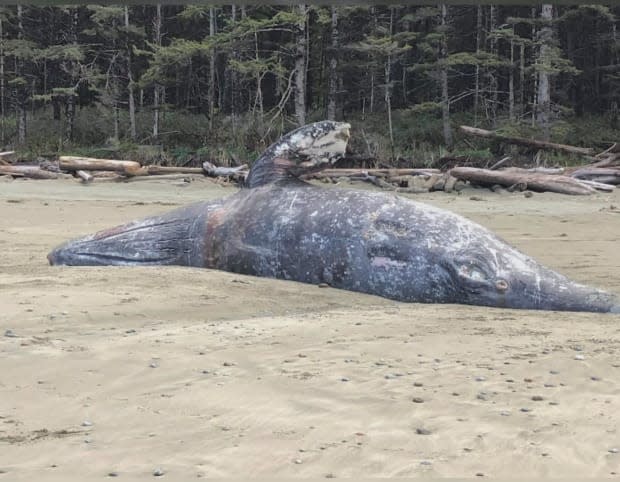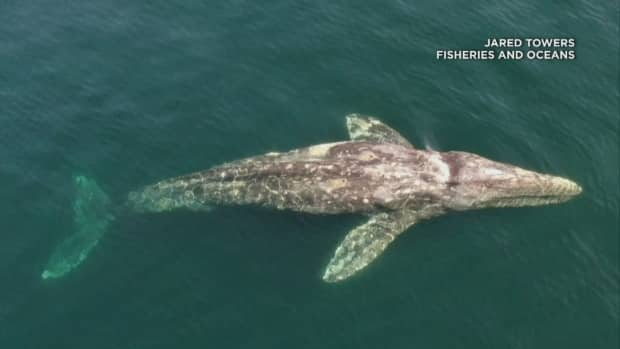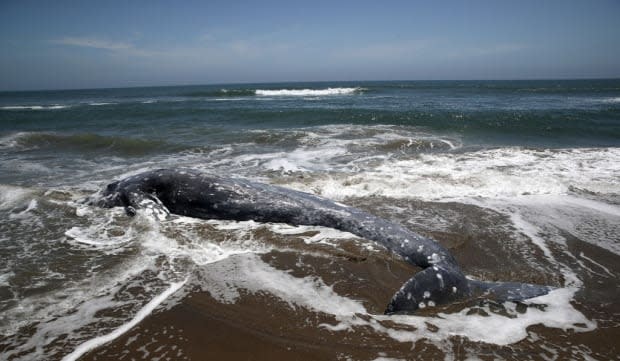Scientists seek to understand increase in grey whale deaths on West Coast

The recent sighting of an emaciated grey whale off Vancouver Island and the discovery of a dead whale washed up on a B.C. beach highlights concerns that the marine mammals are dying in increasing numbers.
Angela Menzies was beachcombing with her son on northern Vancouver Island in April when they spied something on the beach that looked like a huge tree trunk, but with a fin.
As they got closer they realized it was a grey whale.
"My seven-year-old kept saying, 'Mom, I don't want to see this, it's sad to see a whale dead,'" Menzies said.
Officials have not released a cause of death, but they say dead grey whales on the West Coast of Canada have been increasing in number since 2018.

Fisheries and Oceans Canada (DFO) says 21 of the animals, which can grow up to 15 metres long and weigh 40 tonnes, have been found dead since then.
Officials with the National Oceanic and Atmospheric Association (NOAA) in the U.S. say those 21 whales are among the 450 grey whale strandings that have occurred in the past two years in what it calls an "unusual mortality event."
"Mortalities of grey whales have been observed along the entire west coast of North America from Mexico to Alaska," it says in a section of its website dedicated to tracking deaths of the animals since 2019.
NOAA declares an unusual mortality event when a number of criteria are met, including a dramatic increase in deaths compared to prior records and the animals themselves exhibiting poor health.
Not only have dead grey whales been found regularly up and down the West Coast, others have been spotted swimming in coastal waters looking unwell. In B.C. in April, one was seen off the waters of downtown Victoria, looking emaciated and unhealthy. It was later photographed off the northeast coast of Vancouver Island, but has not been seen since.

Scientists believe that in addition to the recorded grey whale strandings, many more are dying in the ocean and not washing up to be found.
"They may simply sink at sea or drift farther out to sea or they may come to shore in an unpopular region and may not be counted," said Anna Hall, a marine biologist who studies how underwater sounds affect marine mammals along with pollution.
NOAA estimates that the recorded strandings only represent up to about 13 per cent of all deaths. In January it said the population of grey whales that migrate along the West Coast has declined by about 24 per cent since 2016 to about 20,580 animals.
There are three distinct groups of grey whales, two of which are considered endangered in Canada. The Northern Pacific Migratory population, which is not at risk, and the Pacific Coast Feeding Group population, which is endangered along with the Western Pacific population.
Why?
Scientists don't know for sure what is causing the deaths, but they suspect it could be related to an insufficient food supply. Some of the deaths have been caused by boat strikes.
Investigators are evaluating ecosystem changes that may be impacting grey whale habitat and food supply, but they're also looking into impacts from harmful algal blooms, infectious disease, natural predation, and human interactions.

It's not the first time grey whales have experienced an unusual mortality event. In 1999 and 2000 the population dropped 23 per cent before recovering and increasing in number to 27,000 by 2016. Researchers never identified a specific cause for that die-off, but noted many of the animals appeared malnourished.
Hall is hopeful whatever is causing the die-off now will pass and the species will recover again.
"Grey whales we know can be resilient," she said. "They have demonstrated resilience, while facing tremendous human pressures … that goes back to the commercial whaling days."
To help the whales, Hall wants boaters to keep their distance, but also report any sightings of emaciated or dead whales to DFO.

 Yahoo Finance
Yahoo Finance 